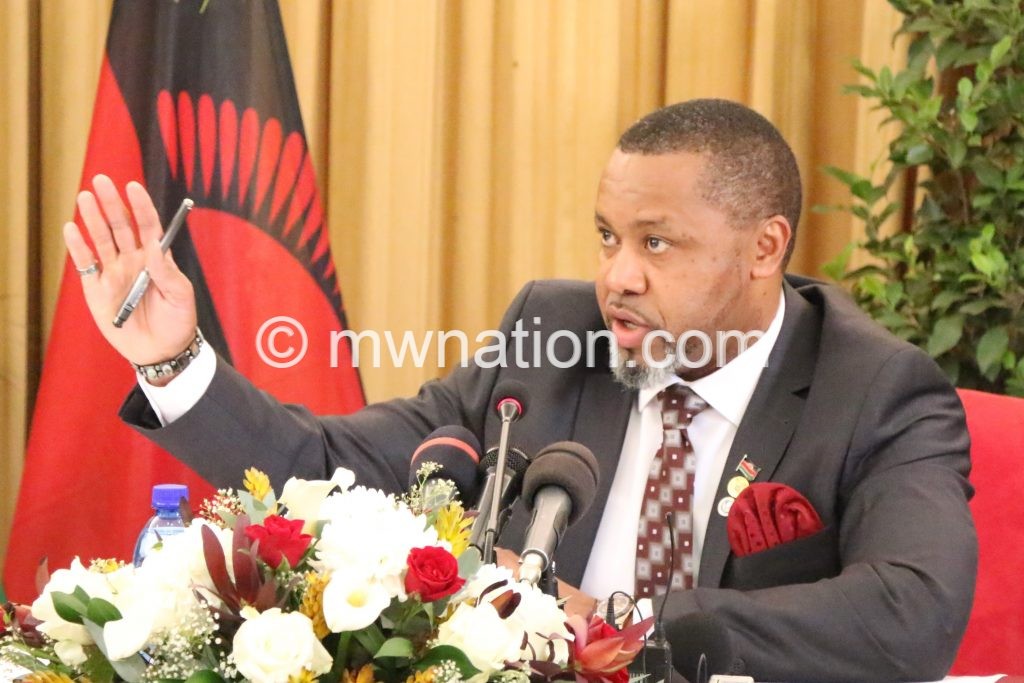Escom’s K53bn burden eased
Power utility Escom will not get the financial bailout it craved for, but can now breathe a sigh of relief following the new administration’s decision to stagger repayment of K53 billion the parastatal owes key supplier Egenco.
In a statement issued yesterday, the Office of the Vice-President said the resolution to spread the financially-squeezed Electricity Supply Corporation of Malawi’s (Escom) debt followed an agreement between Escom and Electricity Generation Company (Egenco) on the way forward to resolve a dispute relating to arrears.

The outstanding arrears choked the operations of both Escom and Egenco.
Reads the statement in part: “It has been agreed that Escom should pay K11.7 billion out of the K53 billion which it owes Egenco by December 31 2020. Sixty [60] percent of the balance equivalent to K25.2 billion to be paid by December 31 2021.
“The Ministry of Finance will also facilitate that Egenco issues a credit note for the remaining 40 percent balance. This means no bailout for Escom.”

By issuing a credit note, financial market analyst Armstrong Kamphoni said Escom will be liable to pay 60 percent of the debt it owes to Egenco within the two-year period while the 40 percent would be written off.
But Consumers Association of Malawi (Cama) executive director John Kapito yesterday feared that the decision could have huge implications on consumers.
He said: “High tariffs and poor service delivery will be the two main issues that consumers will suffer as a result of this K53 billion which can only be recouped through an increase in tariffs.
“Really, this has huge implications on consumers. This is a matter that could have been seriously considered before the unbundling of Escom to form Egenco.”
On his part, former Escom chief executive officer Kandi Padambo, in an interview, said there was need to review the price Egenco charges Escom for the power it supplies.
He said the agreed credit note, equivalent to about K16 billion, had failed to meet the criteria of fair pricing as fair value between willing buyer and willing seller.
Said Padambo: “Since all parties were involved, one can only hope that the agreement will work without burdening electricity consumers. The debt is clearly a result of sub-optimal decisions and mostly imposed on managements of both Egenco and Escom, not out of normal operations of the two companies.
“Another alternative would be to analyse the pricing of Egenco, a monopoly supplier to Escom, and how, over the years, the huge debt accumulated. Escom could be made to pay only that part of the debt that would reflect a fair price in relation to the Mera [Malawi Energy Regulatory Authority] regulated electricity tariffs charged by Escom.”
He said it was not a bad idea to create a separate incorporated company out of Escom’s generation unit. He observed that efficiency advantages that might have accrued even to the benefit of electricity customers were negated by management factors that impacted negatively on the utility supplier’s operations.
Grain Malunga, an energy expert, said the agreement is feasible.
“There will be no impact on the consumer since price review by Escom is approved and monitored by Mera,” he said.
In a separate interview, Escom public relations manager Innocent Chitosi said the utility supplier was part of the negotiation process and that they agree with the statement.
He said: “We shall expedite to implement the agreements.”
Yesterday’s statement also said the Ministry of Finance will facilitate the review and amendment of the current Power Purchase Agreement (PPA) and ensure that the new arrangement is effected by November 1 2020.
Mera records show that Escom currently sells its electricity to consumers at K88.02 per kilowatt hour.
Last month, Minister of Energy Newton Kambala observed that Escom’s bad financial position was negatively affecting operations of other sectors and stakeholders, including Egenco, thereby stalling economic growth.
He said the new administration would consider bailing out the parastatal. In May 2018, Treasury rejected Escom’s initial request for a K50 billion bailout.
The recent agreement follows a meeting Vice-President Saulos Chilima held on August 7 2020 with Escom, Egenco, Mera, Ministry of Finance, Ministry of Energy and the Public Sector Reforms Unit to find solutions to the dispute under the ongoing reforms in parastatal organisations.
During the meeting, Chilima, who heads the public sector reforms, ordered Escom to stop buying diesel for Aggreko to generate the country’s power using generators.
He said he established that there were a number of bottlenecks that needed to be dealt with first before coming up with the roadmap.
Meanwhile, a task team has been set up to drive Escom’s turn-around strategy and the roadmap which will be made public and monitored under the Public Sector Reforms Programme.
Escom—a monopoly for years—last year said it found itself in a bad financial standing after its split that midwifed Egenco on January 1 2017 as part of the Power Market Restructuring Programme aimed at improving efficiency in the market by, among others, having separate power generation and distribution entities.
The split meant Escom had to buy power from Egenco and sell the same to consumers at a cost-reflective rate.
Escom is also saddled by bad procurement decisions estimated at K18 billion for equipment former board chairperson Thom Mpinganjira said the parastatal may not need for years.





